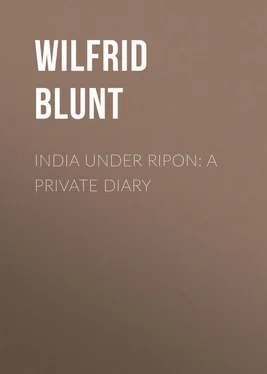Wilfrid Blunt - India Under Ripon - A Private Diary
Здесь есть возможность читать онлайн «Wilfrid Blunt - India Under Ripon - A Private Diary» — ознакомительный отрывок электронной книги совершенно бесплатно, а после прочтения отрывка купить полную версию. В некоторых случаях можно слушать аудио, скачать через торрент в формате fb2 и присутствует краткое содержание. Жанр: foreign_antique, foreign_prose, на английском языке. Описание произведения, (предисловие) а так же отзывы посетителей доступны на портале библиотеки ЛибКат.
- Название:India Under Ripon: A Private Diary
- Автор:
- Жанр:
- Год:неизвестен
- ISBN:нет данных
- Рейтинг книги:4 / 5. Голосов: 1
-
Избранное:Добавить в избранное
- Отзывы:
-
Ваша оценка:
- 80
- 1
- 2
- 3
- 4
- 5
India Under Ripon: A Private Diary: краткое содержание, описание и аннотация
Предлагаем к чтению аннотацию, описание, краткое содержание или предисловие (зависит от того, что написал сам автор книги «India Under Ripon: A Private Diary»). Если вы не нашли необходимую информацию о книге — напишите в комментариях, мы постараемся отыскать её.
India Under Ripon: A Private Diary — читать онлайн ознакомительный отрывок
Ниже представлен текст книги, разбитый по страницам. Система сохранения места последней прочитанной страницы, позволяет с удобством читать онлайн бесплатно книгу «India Under Ripon: A Private Diary», без необходимости каждый раз заново искать на чём Вы остановились. Поставьте закладку, и сможете в любой момент перейти на страницу, на которой закончили чтение.
Интервал:
Закладка:
“ 8th Dec. – Saw a Mekkawi, one Seyd Abdullah, a merchant, who gave us a great deal of information both about Meccan and Hyderabad politics. He is a great admirer of the Sherif Abd-el-Mutalleb, whom he remembered as a boy at Mecca, for he has been here thirty years without going home. He told us of the rebellions of Abd-el-Mutalleb against the Turks, and how, when they fired at him in the street, he used to throw his cloak open so as to show he had no fear. The Sherifs used to keep the Arabs in rebellion for fear they should join the Turks against them. In his old age Abd-el-Mutalleb had taken to opium and spent his days in sleep, and so had been deposed. My visitor is himself a pure Arab, and his language is easy to understand. His chief lamentation was at living away from home, and that it was impossible to get Arab wives here. They would not leave Arabia, and the Arabs of Hyderabad, of whom there are a large number, were obliged to marry the women of the place.
“With regard to Hyderabad politics, he spoke with the greatest enthusiasm of the late Salar Jung, who was himself of Arab descent. He described the state of things when he first came here thirty years ago, how people killed each ether openly in the streets, and how the great Minister had established peace everywhere. I asked him about the Shiahs, and he said there was no quarrel here between them and the Sunnis. He himself was a Sunni, but they all prayed together. They were on good terms, too, with the Hindus. The Hindus did not eat with them, but that was all. Of Laik Ali he spoke very highly, said he was a young man of good thought and good language, and would become a great Minister like his father. All the people loved him. As to the Peishkar he neglected public business. He had no energy, and letters of importance were put aside. It was very different from old Salar Jung’s time. I asked him about the Nizam, whom he spoke of as the ‘Pasha,’ and he said he was good, not at all dull, but that he was young, and the nobles about him taught him to be silent in public, and so he seemed lacking in intelligence, but with his own people he talked and was merry enough. I like this Meccan merchant much, and doubt if there are many shop-keepers in London who could give me as sensible an account of their local politics as he has given me. The Hindus in the Deccan are mostly men of the lower castes. There are few nobles or Brahmins among them, and their only rich men are the money-lenders. The rest are shop-keepers, and out of the town peasants. The Peishkar is their only great man.
“The Nizam came to dinner at the Residency, and took Anne in. There was also a large party of Nawabs and dignitaries, the Peishkar, Salar Jung, Kurshid Jah, Bushir-ed-Dowlah, Vikar-el-Omra, and the rest, as well as the Roman Catholic bishop and some English. Kurshid Jah has asked us to dinner for Tuesday, but neither to him, nor to the Peishkar can we go, as we leave on Monday. The Nizam was as usual very silent, but this is etiquette. Trevor tells me the Nizam’s father never spoke at all to the English officials, or even looked at them.
“ 9th Dec. – The schoolmaster called again. He asked me what the Mohammedans ought to do to better their condition. Every year they were becoming poorer in India. The Government ruined them where they had land with taxes, and they had no employment in the towns. I suggested they should take to trade, learn English, and compete with the Hindus, and he agreed with me that that might be best. He said, however, that in many parts a Mohammedan who learned English was still called a kafr by his fellows. Here at Hyderabad the taxes were not excessive, but the English system surrounded them, and English goods were killing the native industries. He said if nothing were done to help them, the English Government would have every Mohammedan in the country against them.
“He also complained terribly of the tyranny of the English officials and their brutal manners. He asked how it was that I was different from them, that I made him sit down on the same sofa with myself, that I addressed him politely, and did not treat him as a slave. The officials, he said, sit without moving in their chairs and talk to us, while they leave us standing, abruptly in words of command, without any salutation or words of friendship. You treat me, a poor man, as your equal. Why is this? I explained to him there were degrees of good breeding amongst us, and that the better the breeding the greater the politeness. That the men who came out to India as Government servants were, many of them, taken from a comparatively low rank in life, and that, being unused to refined society, or to being treated with much consideration at home, they lost their heads when they found themselves in India in a position of power. I hoped, however, that this might soon be changed. He said the officials made their nation hated by the people; many who were willing to think the English Government was good were estranged by the manners of its officials. He asked me again why I travelled so far to see them, and why I cared to help them, and I explained that in youth I had led a life of folly, and that I wished to do some good before I died, and that I had received much kindness from the Moslems, and learned from them to believe in God, and so I spent a portion of every year among them. I like the man much.
“At ten we went to breakfast with Salar Jung, a farewell visit. We had bargained to have no English with us, and the party consisted of himself, his brother, and his sister’s governess Mdlle. Gaignaud, of Seyd Huseyn Bilgrami, and of our two selves. We talked very freely of the political situation, which is this. In a few weeks the Nizam will come of age, and an attempt is going to be made by the Residency to get his signature to a treaty which, in renewing the alliance existing between the Nizam and the Government of India, contains an article abrogating all previous treaties, thus putting the Berar provinces permanently into English hands.”
The question of the Berars was this. Many years ago, before the time of old Salar Jung, the Hyderabad State was badly governed, and its finances became so involved that the Nizam was obliged to borrow several millions sterling from the Calcutta Government. The Government took in pledge for the debt the provinces in question, which were the richest he possessed, it being agreed that they should be administered by the Government of India until the loan was repaid. This arrangement naturally gave much employment to Englishmen and many highly paid posts to members of the Covenanted Civil Service, and it has consequently been their settled policy to make the resumption of the provinces by the Nizam impossible. In this view the provinces have been exceptionally well administered; the taxation has been light, and everything has been done to make the peasantry satisfied with English rule, so that they form a striking contrast with most parts of British India. It was never expected that the Nizam would be able to repay his debt, but, in case he could, the prosperity of the provinces would then, it was thought, be a reason for refusing. This is precisely what happened. Salar Jung, being a man of great ability, not only restored order in the Deccan, but brought the Hyderabad finances into so prosperous a condition that he was able to come forward with the borrowed millions in his hand, and claimed their repayment and the restitution of the provinces. It was for his insistence on this point that his persecution at the hands of the Imperial Government began, and was carried on relentlessly until his death. The claim, however, still remained, and could not be contested, as it was embodied in a public treaty between the two States, and advantage was being taken of the Nizam’s minority and the death of his powerful Minister to get it annulled.
Читать дальшеИнтервал:
Закладка:
Похожие книги на «India Under Ripon: A Private Diary»
Представляем Вашему вниманию похожие книги на «India Under Ripon: A Private Diary» списком для выбора. Мы отобрали схожую по названию и смыслу литературу в надежде предоставить читателям больше вариантов отыскать новые, интересные, ещё непрочитанные произведения.
Обсуждение, отзывы о книге «India Under Ripon: A Private Diary» и просто собственные мнения читателей. Оставьте ваши комментарии, напишите, что Вы думаете о произведении, его смысле или главных героях. Укажите что конкретно понравилось, а что нет, и почему Вы так считаете.












